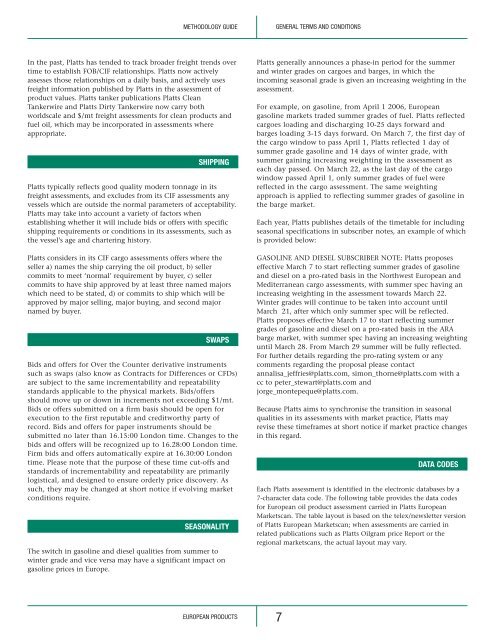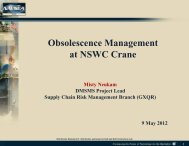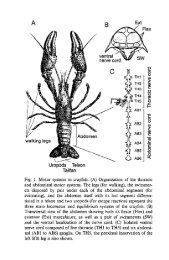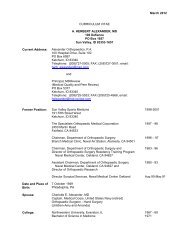Download - Mecca Hosting ® - Coming Soon
Download - Mecca Hosting ® - Coming Soon
Download - Mecca Hosting ® - Coming Soon
Create successful ePaper yourself
Turn your PDF publications into a flip-book with our unique Google optimized e-Paper software.
In the past, Platts has tended to track broader freight trends over<br />
time to establish FOB/CIF relationships. Platts now actively<br />
assesses those relationships on a daily basis, and actively uses<br />
freight information published by Platts in the assessment of<br />
product values. Platts tanker publications Platts Clean<br />
Tankerwire and Platts Dirty Tankerwire now carry both<br />
worldscale and $/mt freight assessments for clean products and<br />
fuel oil, which may be incorporated in assessments where<br />
appropriate.<br />
METHODOLOGY GUIDE GENERAL TERMS AND CONDITIONS<br />
SHIPPING<br />
Platts typically reflects good quality modern tonnage in its<br />
freight assessments, and excludes from its CIF assessments any<br />
vessels which are outside the normal parameters of acceptability.<br />
Platts may take into account a variety of factors when<br />
establishing whether it will include bids or offers with specific<br />
shipping requirements or conditions in its assessments, such as<br />
the vessel’s age and chartering history.<br />
Platts considers in its CIF cargo assessments offers where the<br />
seller a) names the ship carrying the oil product, b) seller<br />
commits to meet ‘normal’ requirement by buyer, c) seller<br />
commits to have ship approved by at least three named majors<br />
which need to be stated, d) or commits to ship which will be<br />
approved by major selling, major buying, and second major<br />
named by buyer.<br />
SWAPS<br />
Bids and offers for Over the Counter derivative instruments<br />
such as swaps (also know as Contracts for Differences or CFDs)<br />
are subject to the same incrementability and repeatability<br />
standards applicable to the physical markets. Bids/offers<br />
should move up or down in increments not exceeding $1/mt.<br />
Bids or offers submitted on a firm basis should be open for<br />
execution to the first reputable and creditworthy party of<br />
record. Bids and offers for paper instruments should be<br />
submitted no later than 16.15:00 London time. Changes to the<br />
bids and offers will be recognized up to 16.28:00 London time.<br />
Firm bids and offers automatically expire at 16.30:00 London<br />
time. Please note that the purpose of these time cut-offs and<br />
standards of incrementability and repeatability are primarily<br />
logistical, and designed to ensure orderly price discovery. As<br />
such, they may be changed at short notice if evolving market<br />
conditions require.<br />
SEASONALITY<br />
The switch in gasoline and diesel qualities from summer to<br />
winter grade and vice versa may have a significant impact on<br />
gasoline prices in Europe.<br />
EUROPEAN PRODUCTS<br />
Platts generally announces a phase-in period for the summer<br />
and winter grades on cargoes and barges, in which the<br />
incoming seasonal grade is given an increasing weighting in the<br />
assessment.<br />
For example, on gasoline, from April 1 2006, European<br />
gasoline markets traded summer grades of fuel. Platts reflected<br />
cargoes loading and discharging 10-25 days forward and<br />
barges loading 3-15 days forward. On March 7, the first day of<br />
the cargo window to pass April 1, Platts reflected 1 day of<br />
summer grade gasoline and 14 days of winter grade, with<br />
summer gaining increasing weighting in the assessment as<br />
each day passed. On March 22, as the last day of the cargo<br />
window passed April 1, only summer grades of fuel were<br />
reflected in the cargo assessment. The same weighting<br />
approach is applied to reflecting summer grades of gasoline in<br />
the barge market.<br />
Each year, Platts publishes details of the timetable for including<br />
seasonal specifications in subscriber notes, an example of which<br />
is provided below:<br />
GASOLINE AND DIESEL SUBSCRIBER NOTE: Platts proposes<br />
effective March 7 to start reflecting summer grades of gasoline<br />
and diesel on a pro-rated basis in the Northwest European and<br />
Mediterranean cargo assessments, with summer spec having an<br />
increasing weighting in the assessment towards March 22.<br />
Winter grades will continue to be taken into account until<br />
March 21, after which only summer spec will be reflected.<br />
Platts proposes effective March 17 to start reflecting summer<br />
grades of gasoline and diesel on a pro-rated basis in the ARA<br />
barge market, with summer spec having an increasing weighting<br />
until March 28. From March 29 summer will be fully reflected.<br />
For further details regarding the pro-rating system or any<br />
comments regarding the proposal please contact<br />
annalisa_jeffries@platts.com, simon_thorne@platts.com with a<br />
cc to peter_stewart@platts.com and<br />
jorge_montepeque@platts.com.<br />
Because Platts aims to synchronise the transition in seasonal<br />
qualities in its assessments with market practice, Platts may<br />
revise these timeframes at short notice if market practice changes<br />
in this regard.<br />
7<br />
DATA CODES<br />
Each Platts assessment is identified in the electronic databases by a<br />
7-character data code. The following table provides the data codes<br />
for European oil product assessment carried in Platts European<br />
Marketscan. The table layout is based on the telex/newsletter version<br />
of Platts European Marketscan; when assessments are carried in<br />
related publications such as Platts Oilgram price Report or the<br />
regional marketscans, the actual layout may vary.






